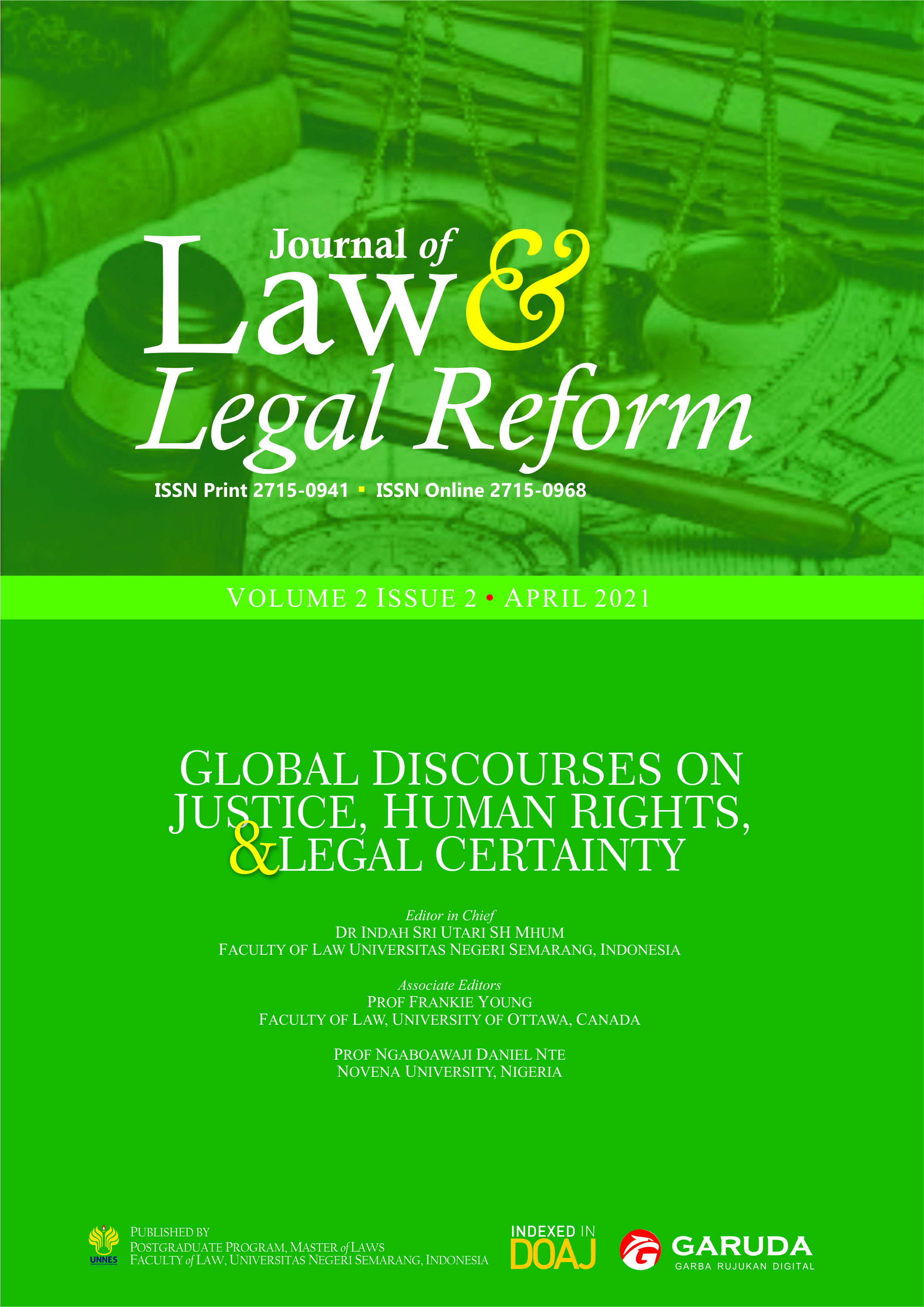The Implementation of Capital Punishment in Indonesia: The Human Rights Discourse
Main Article Content
Abstract
Human rights are the most basic rights possessed by humans and this right is considered a gift given from God Almighty. Human rights are also protected by the State because the state also highly respects the human rights of a person by providing strict and binding rules for its citizens so that they do not perceive the human rights possessed by others. Capital punishment is one of the means to protect public interests of a social nature which are endangered by irreparable crimes. This paper is intended to analyze the capital punishment or death penalty in Indonesia in the context of human rights. The research method used in this paper is using the normative method. The results of this study indicated that the execution of the death penalty can be carried out for perpetrators of criminal acts who have crossed the human limit, endanger, and threaten many people.
Article Details
All writings published in this journal are personal views of the authors and do not represent the views of this journal and the author's affiliated institutions. Author(s) retain copyrights under a Creative Commons Attribution-NonCommercial-ShareAlike 4.0 International (CC BY-NC-SA 4.0).
References
Anjari, W. (2018). Penjatuhan Pidana Mati di Indonesia dalam Perspektif Hak Asasi Manusia. E-Journal Widya Yustisia, 1(2), 107-115.
Arief, B. N. (2010). Masalah Penegakan Hukum dan Kebijakan Hukum Pidana Dalam Penanggulangan Kejahatan. Jakarta: Prenadamedia Group.
BBC. (2015). “Pegiat HAM Kecam Eksekusi Hukuman Mati Narkobaâ€, BBC News Online, January 16, 2015.
Retrieved from https://www.bbc.com/indonesia/berita_indonesia/2015/01/150116_eksekusi_terpidana_narkoba
Kitab Undang-Undang Hukum Pidana
Muladi, M. (2004). Hak Asasi Manusia Hakekat, Konsep dan Implikasinya dalam Perspektif Hukum dan Masyarakat. Jakarta: Refika Aditama.
Nazmi, D. (1992). Konsepsi Negara Hukum. Padang: Angkasa Raya.
Perkapolri No. 12 Tahun 2010 tentang Tata Cara Pelaksanaan Pidana Mati.
Poernomo, B. (1982). Hukum Pidana Kumpulan Karangan Ilmiah. Jakarta: Bina Aksara.
Sakidjo, A., & Poernomo, B. (1990). Hukuman Pidana, Dasar Aturan Umum Hukum Pidana Kodifikasi. Jakarta: Ghalia Indonesia.
Saputri, D. S. (2016). “Pengamat: Huku,am Mati Tak Berarti Melanggar HAMâ€, REPUBLIKA Online, July 28, 2016. Retrieved from https://www.republika.co.id/berita/nasional/hukum/16/07/28/ob0oa3365-pengamat-hukuman-mati-tak-berarti-melanggar-ham
Undang-Undang Nomor 35 Tahun 2009 tentang Narkotika.
Undang-Undang Nomor 39 Tahun 1999 tentang Hak Asasi Manusia.
Waluyo, B. (2000). Pidana dan Pemidanaan. Jakarta: Sinar Grafika.
McRae, D. (2017). Indonesian capital punishment in comparative perspective. Bijdragen tot de taal-, land-en volkenkunde/Journal of the Humanities and Social Sciences of Southeast Asia, 173(1), 1-22.
Zimring, F. E., & Johnson, D. T. (2008). Law, society, and capital punishment in Asia. Punishment & Society, 10(2), 103-115.
Leechaianan, Y., & Longmire, D. R. (2013). The use of the death penalty for drug trafficking in the United States, Singapore, Malaysia, Indonesia and Thailand: A comparative legal analysis. Laws, 2(2), 115-149.
Ahmad, I. F. (2021). Why Indonesia Mantain Capital Punishment. Fiat Justicia Jurnal Ilmu Hukum Fakultas Hukum Universitas Lampung, 15(1), 25-38.
Hood, R. (2001). Capital punishment: A global perspective. Punishment & Society, 3(3), 331-354.
